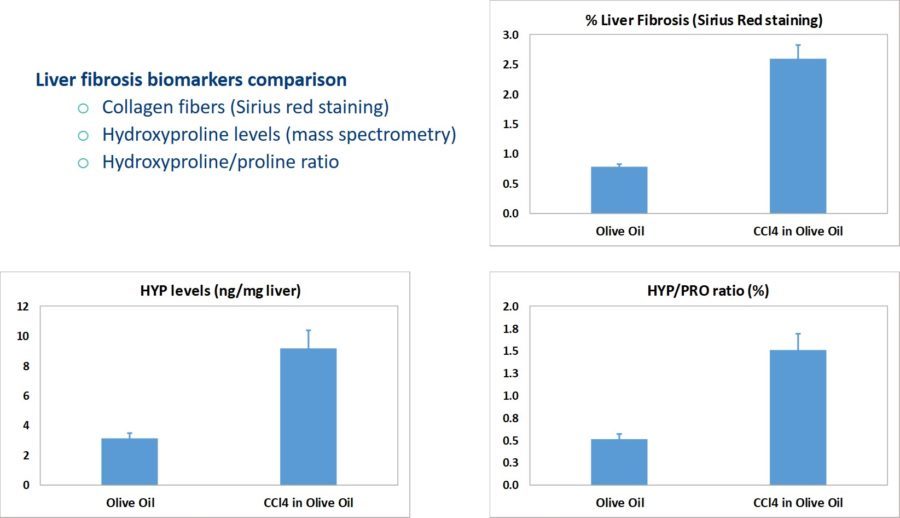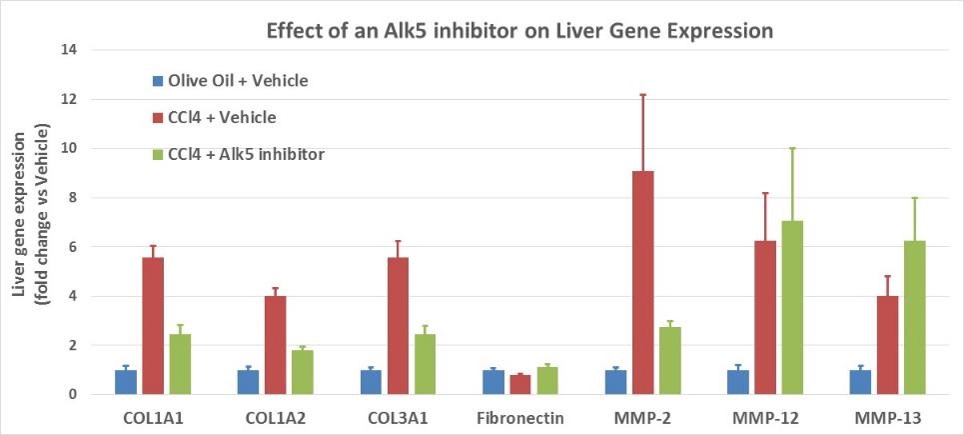


Etudes précliniques pour les maladies inflammatoires du foie
Les maladies inflammatoires aiguës et chroniques du foie peuvent être déclenchées par plusieurs causes telles que l’exposition à des produits chimiques toxiques, l’alimentation ou une dysrégulation immunitaire. Les modèles d’inflammation hépatique reposant sur des rongeurs permettent de déchiffrer les mécanismes qui déclenchent et entretiennent la maladie chez l’Homme.
Oncodesign Services propose une large gamme de modèles précliniques utilisables pour diverses pathologies hépatiques, et offre le développement de nouveaux modèles de recherche récemment décrits dans la littérature.
Critères d’évaluation de l’inflammation hépatique
- Stéatose
- Fibrose
- Score NASH
- Infiltration par des neutrophiles
- Biomarqueurs sériques des lésions hépatiques : LDH, ALAT, ASAT
- Biomarqueurs inflammatoires
- Infiltrats de cellules immunitaires
- Dégénérescence des hépatocytes par ballonnement
- Marqueurs d’apoptose ou nécrose à l’examen histologique
- Expression génique dans le foie, par PCR quantitative/génétique
Découvrez les solutions d’Oncodesign Services pour les maladies inflammatoires hépatiques
-
Modèles murins de lésions hépatiques aiguës
- FasL, acétaminophène
-
Modèles murins de lésions hépatiques chroniques
- Fibrose induite par le CCl4
- NASH induite par la STZ + régime gras
- NASH induite par le CCl4 + régime gras
- NASH-CHC à long terme

Etude de cas pour les maladies inflammatoires hépatiques
Le modèle de fibrose hépatique induite par le CCl4 est un modèle classique largement utilisé à des fins de recherche. Des souris juvéniles reçoivent des doses répétées de CCl4. La fibrose hépatique apparaît alors généralement à l’âge de 6 semaines.
Ce modèle est utile pour les thérapies visant à moduler les dépôts de collagène et l’expression des métalloprotéases. Un inhibiteur d’ALK5 (récepteur du TGF-β de type I), développant un mécanisme antifibrotique bien connu, diminue l’induction du collagène et est utilisé comme molécule de référence.


-
Références
(1) Acute liver injury models in mice
FasL:
Shao R, Yang Y, Fan K, Wu X, Jiang R, Tang L, Li L, Shen Y, Liu G, Zhang L. REV-ERBα Agonist GSK4112 attenuates Fas-induced Acute Hepatic Damage in Mice. Int J Med Sci. 2021 Oct 25;18(16):3831-3838. doi: 10.7150/ijms.52011. PMID: 34790059; PMCID: PMC8579287. https://www.medsci.org/v18p3831.htm
Ogasawara J, Watanabe-Fukunaga R, Adachi M, Matsuzawa A, Kasugai T, Kitamura Y, Itoh N, Suda T, Nagata S. Lethal effect of the anti-Fas antibody in mice. Nature. 1993 Aug 26;364(6440):806-9. doi: 10.1038/364806a0. Erratum in: Nature 1993 Oct 7;365(6446):568. PMID: 7689176 https://www.nature.com/articles/364806a0
Lesnikov V, Gorden N, Fausto N, Spaulding E, Campbell J, Shulman H, Fleming RE, Deeg HJ. Transferrin fails to provide protection against Fas-induced hepatic injury in mice with deletion of functional transferrin-receptor type 2. Apoptosis. 2008 Aug;13(8):1005-12. doi: 10.1007/s10495-008-0233-6. PMID: 18561026; PMCID: PMC2574612. https://link.springer.com/article/10.1007/s10495-008-0233-6
Ohtaki Y, Yamaguchi K, Yu Z, Kumamoto H, Shimauchi H, Iwakura Y, Sugawara S, Endo Y. Hepatic platelet accumulation in Fas-mediated hepatitis in mice. Int Immunopharmacol. 2009 Aug;9(9):1071-8. doi: 10.1016/j.intimp.2009.04.016. Epub 2009 May 9. PMID: 19439197. https://www.sciencedirect.com/science/article/pii/S1567576909001659?via%3Dihub
Donthamsetty S, Mars WM, Orr A, Wu C, Michalopoulos GK. Protection against Fas-induced fulminant hepatic failure in liver specific integrin linked kinase knockout mice. Comp Hepatol. 2011 Nov 21;10:11. doi: 10.1186/1476-5926-10-11. PMID: 22104495; PMCID: PMC3228663. https://www.ncbi.nlm.nih.gov/pmc/articles/PMC3228663/
Acetaminophen:
- Mechanism:
Ni HM, McGill MR, Chao X, Du K, Williams JA, Xie Y, Jaeschke H, Ding WX. Removal of acetaminophen protein adducts by autophagy protects against acetaminophen-induced liver injury in mice. J Hepatol. 2016 Aug;65(2):354-62. doi: 10.1016/j.jhep.2016.04.025. Epub 2016 May 2. PMID: 27151180; PMCID: PMC4955750. https://www.journal-of-hepatology.eu/article/S0168-8278(16)30169-6/fulltext
Groeneveld D, Cline-Fedewa H, Baker KS, Williams KJ, Roth RA, Mittermeier K, Lisman T, Palumbo JS, Luyendyk JP. Von Willebrand factor delays liver repair after acetaminophen-induced acute liver injury in mice. J Hepatol. 2020 Jan;72(1):146-155. doi: 10.1016/j.jhep.2019.09.030. Epub 2019 Oct 10. PMID: 31606553; PMCID: PMC6941657. https://www.journal-of-hepatology.eu/article/S0168-8278(19)30600-2/fulltext
- Review:
Mossanen JC, Tacke F. Acetaminophen-induced acute liver injury in mice. Lab Anim. 2015 Apr;49(1 Suppl):30-6. doi: 10.1177/0023677215570992. PMID: 25835736. https://journals.sagepub.com/doi/10.1177/0023677215570992?url_ver=Z39.88-2003&rfr_id=ori:rid:crossref.org&rfr_dat=cr_pub%20%200pubmed
osner I, Romero-Ferret C, Mottot G. Letter: Treatment of acute paracetamol poisoning. Lancet. 1973 Dec 1;2(7840):1273-4. doi: 10.1016/s0140-6736(73)91024-6. PMID: 4128608 https://www.thelancet.com/journals/lancet/article/PIIS0140-6736(73)91024-6/fulltext
- Testing compounds :
Jaeschke H, Akakpo JY, Umbaugh DS, Ramachandran A. Novel Therapeutic Approaches Against Acetaminophen-induced Liver Injury and Acute Liver Failure. Toxicol Sci. 2020 Apr 1;174(2):159-167. doi: 10.1093/toxsci/kfaa002. PMID: 31926003; PMCID: PMC7098369. https://academic.oup.com/toxsci/article/174/2/159/5700748?login=false
Niu B, Lei X, Xu Q, Ju Y, Xu D, Mao L, Li J, Zheng Y, Sun N, Zhang X, Mao Y, Li X. Protecting mitochondria via inhibiting VDAC1 oligomerization alleviates ferroptosis in acetaminophen-induced acute liver injury. Cell Biol Toxicol. 2022 Jun;38(3):505-530. doi: 10.1007/s10565-021-09624-x. Epub 2021 Aug 17. PMID: 34401974. https://link.springer.com/article/10.1007/s10565-021-09624-x
- Role of microbiota:
Schneider KM, Elfers C, Ghallab A, Schneider CV, Galvez EJC, Mohs A, Gui W, Candels LS, Wirtz TH, Zuehlke S, Spiteller M, Myllys M, Roulet A, Ouzerdine A, Lelouvier B, Kilic K, Liao L, Nier A, Latz E, Bergheim I, Thaiss CA, Hengstler JG, Strowig T, Trautwein C. Intestinal Dysbiosis Amplifies Acetaminophen-Induced Acute Liver Injury. Cell Mol Gastroenterol Hepatol. 2021;11(4):909-933. doi: 10.1016/j.jcmgh.2020.11.002. Epub 2020 Nov 12. PMID: 33189892; PMCID: PMC7900526 https://www.cmghjournal.org/article/S2352-345X(20)30181-8/fulltext
(2) Chronic liver injury models in mice
- Review :
Ravichandra A, Schwabe RF. Mouse Models of Liver Fibrosis. Methods Mol Biol. 2021;2299:339-356. doi: 10.1007/978-1-0716-1382-5_23. PMID: 34028753. https://link.springer.com/protocol/10.1007/978-1-0716-1382-5_23
- CCl4 fibrosis
Scholten D, Trebicka J, Liedtke C, Weiskirchen R. The carbon tetrachloride model in mice. Lab Anim. 2015 Apr;49(1 Suppl):4-11. doi: 10.1177/0023677215571192. PMID: 25835733.
Chang J, Lan T, Li C, Ji X, Zheng L, Gou H, Ou Y, Wu T, Qi C, Zhang Q, Li J, Gu Q, Wen D, Cao L, Qiao L, Ding Y, Wang L. Activation of Slit2-Robo1 signaling promotes liver fibrosis. J Hepatol. 2015 Dec;63(6):1413-20. doi: 10.1016/j.jhep.2015.07.033. Epub 2015 Aug 8. PMID: 26264936. https://www.journal-of-hepatology.eu/article/S0168-8278(15)00536-X/fulltext
Arroyo N, Villamayor L, Díaz I, Carmona R, Ramos-Rodríguez M, Muñoz-Chápuli R, Pasquali L, Toscano MG, Martín F, Cano DA, Rojas A. GATA4 induces liver fibrosis regression by deactivating hepatic stellate cells. JCI Insight. 2021 Dec 8;6(23):e150059. doi: 10.1172/jci.insight.150059. PMID: 34699385; PMCID: PMC8675192. https://insight.jci.org/articles/view/150059
Shrestha N, Chand L, Han MK, Lee SO, Kim CY, Jeong YJ. Glutamine inhibits CCl4 induced liver fibrosis in mice and TGF-β1 mediated epithelial-mesenchymal transition in mouse hepatocytes. Food Chem Toxicol. 2016 Jul;93:129-37. doi: 10.1016/j.fct.2016.04.024. Epub 2016 Apr 29. PMID: 27137983. https://www.sciencedirect.com/science/article/abs/pii/S0278691516301302?via%3Dihub
Wu H, Chen G, Wang J, Deng M, Yuan F, Gong J. TIM-4 interference in Kupffer cells against CCL4-induced liver fibrosis by mediating Akt1/Mitophagy signalling pathway. Cell Prolif. 2020 Jan;53(1):e12731. doi: 10.1111/cpr.12731. Epub 2019 Nov 22. PMID: 31755616; PMCID: PMC6985653. https://onlinelibrary.wiley.com/doi/10.1111/cpr.12731
- NASH MODELS : STZ+HFD NASH / CCl4+HFD NASH / Long term NASH-HCC
Hansen HH, Feigh M, Veidal SS, Rigbolt KT, Vrang N, Fosgerau K. Mouse models of nonalcoholic steatohepatitis in preclinical drug development. Drug Discov Today. 2017 Nov;22(11):1707-1718. doi: 10.1016/j.drudis.2017.06.007. Epub 2017 Jul 4. PMID: 28687459 https://www.sciencedirect.com/science/article/pii/S1359644617300272?via%3Dihub
Lefebvre E, Moyle G, Reshef R, Richman LP, Thompson M, Hong F, Chou HL, Hashiguchi T, Plato C, Poulin D, Richards T, Yoneyama H, Jenkins H, Wolfgang G, Friedman SL. Antifibrotic Effects of the Dual CCR2/CCR5 Antagonist Cenicriviroc in Animal Models of Liver and Kidney Fibrosis. PLoS One. 2016 Jun 27;11(6):e0158156. doi: 10.1371/journal.pone.0158156. PMID: 27347680; PMCID: PMC4922569. https://journals.plos.org/plosone/article?id=10.1371/journal.pone.0158156
Klein T, Fujii M, Sandel J, Shibazaki Y, Wakamatsu K, Mark M, Yoneyama H. Linagliptin alleviates hepatic steatosis and inflammation in a mouse model of non-alcoholic steatohepatitis. Med Mol Morphol. 2014 Sep;47(3):137-49. doi: 10.1007/s00795-013-0053-9. Epub 2013 Sep 19. PMID: 24048504. https://link.springer.com/article/10.1007/s00795-013-0053-9
Orime K, Shirakawa J, Togashi Y, Tajima K, Inoue H, Nagashima Y, Terauchi Y. Lipid-lowering agents inhibit hepatic steatosis in a non-alcoholic steatohepatitis-derived hepatocellular carcinoma mouse model. Eur J Pharmacol. 2016 Feb 5;772:22-32. doi: 10.1016/j.ejphar.2015.12.043. Epub 2015 Dec 24. PMID: 26724391. https://www.sciencedirect.com/science/article/abs/pii/S0014299915304398

